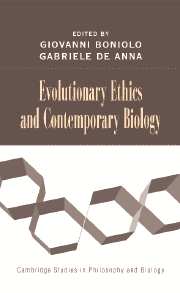Book contents
- Frontmatter
- Contents
- List of Contributors
- Evolutionary Ethics and Contemporary Biology
- Introduction
- PART I THE LIMITS OF EVOLUTIONARY EXPLANATIONS AND JUSTIFICATIONS OF ETHICS
- PART II METHODOLOGICAL ISSUES CONCERNING EVOLUTIONARY ACCOUNTS OF ETHICS
- PART III HOW BIOLOGICAL RESULTS CAN HELP EXPLAIN MORALLY RELEVANT HUMAN CAPACITIES
- PART IV HOW BIOLOGICAL RESULTS CAN HELP EXPLAIN MORAL SYSTEMS
- 8 Biology to Ethics: An Evolutionist's View of Human Nature
- 9 Between Fragile Altruism and Morality: Evolution and the Emergence of Normative Guidance
- 10 Will Genomics Do More for Metaphysics Than Locke?
- Index
- Cambridge Cultural Social Studies
- References
8 - Biology to Ethics: An Evolutionist's View of Human Nature
Published online by Cambridge University Press: 23 July 2009
- Frontmatter
- Contents
- List of Contributors
- Evolutionary Ethics and Contemporary Biology
- Introduction
- PART I THE LIMITS OF EVOLUTIONARY EXPLANATIONS AND JUSTIFICATIONS OF ETHICS
- PART II METHODOLOGICAL ISSUES CONCERNING EVOLUTIONARY ACCOUNTS OF ETHICS
- PART III HOW BIOLOGICAL RESULTS CAN HELP EXPLAIN MORALLY RELEVANT HUMAN CAPACITIES
- PART IV HOW BIOLOGICAL RESULTS CAN HELP EXPLAIN MORAL SYSTEMS
- 8 Biology to Ethics: An Evolutionist's View of Human Nature
- 9 Between Fragile Altruism and Morality: Evolution and the Emergence of Normative Guidance
- 10 Will Genomics Do More for Metaphysics Than Locke?
- Index
- Cambridge Cultural Social Studies
- References
Summary
Humans are animals but a very distinct and unique kind of animal. Our anatomical differences include bipedal gait and enormous brains. But we are notably different also, especially in our individual and social behaviors and in the products of those behaviors. With the advent of humankind, biological evolution transcended itself and ushered in cultural evolution, a more rapid and effective mode of evolution than the biological mode. Products of cultural evolution include science and technology; complex social and political institutions; religious and ethical traditions; language, literature, and art; and electronic communication.
In this chapter, I explore ethics and ethical behavior as a model case to illuminate the interplay between biology and culture. I propose that our exalted intelligence – a product of biological evolution – predisposes us to form ethical judgments, that is, to evaluate actions as either good or evil. I further argue that the moral codes that guide our ethical behavior transcend biology in that they are not biologically determined; rather, they are products of human history, including social and religious traditions.
HUMAN ORIGINS
Mankind is a biological species that has evolved from species that were not human. Our closest biological relatives are the great apes and, among them, the chimpanzees and bonobos, who are more closely related to us than they are to the gorillas, and much more than they are to the orangutans.
- Type
- Chapter
- Information
- Evolutionary Ethics and Contemporary Biology , pp. 141 - 158Publisher: Cambridge University PressPrint publication year: 2006
References
- 3
- Cited by

